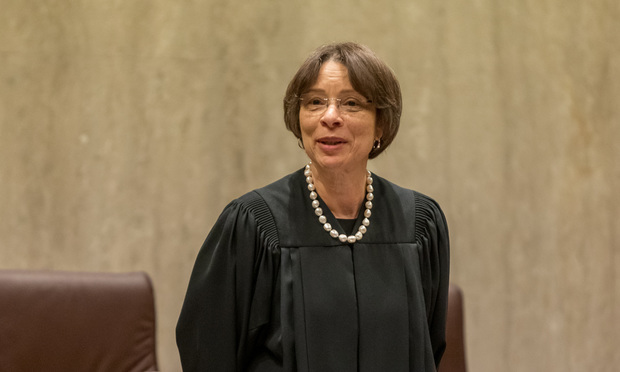Judge Denies Cooley's Bid to DQ King & Spalding in WhatsApp Case
In an order Tuesday, U.S. District Chief Judge Phyllis Hamilton found that WhatsApp did not demonstrate that King & Spalding still has access to confidential material from a previous matter it handled for the messaging company, or even that the material is substantially related to the new case.
June 16, 2020 at 10:48 PM
4 minute read

King & Spalding can continue to defend a surveillance technology firm accused of deploying malware targeted at WhatsApp Inc. users after a federal judge blocked the Facebook subsidiary's attempt to boot the firm from the case.
In an order Tuesday, U.S. District Chief Judge Phyllis Hamilton of the Northern District of California denied WhatsApp's motion to disqualify King & Spalding from representing NSO Group Technologies, finding that WhatsApp did not demonstrate that the law firm still has access to confidential material, or even that the material is substantially related to the new case.
WhatsApp argued that King & Spalding violated "a bedrock requirement of attorney loyalty: the duty to avoid switching sides and opposing a client that it once represented," according to the disqualification filing signed by Cooley's Michael Rhodes in San Francisco. King & Spalding represented the messaging service in a sealed matter in 2016, where it had access to related, confidential information, WhatsApp contended.
Three of the four King & Spalding lawyers who represented WhatsApp in the sealed matter, including current FBI Director Christopher Wray, are no longer with the firm. But Hamilton said she didn't need to delve into whether the lone remaining attorney, Paul Mezzina, gained knowledge of confidential information if the cases were not related.
Hamilton noted the difficulty of comparing the two cases given that one of the matters is entirely under seal and both are mired in technical coding language. Yet, her analysis found that WhatsApp "has not demonstrated that the two matters are substantially related and absent such a relationship, there is no presumption that K&S acquired material confidential information."
 U.S. District Chief Judge Phyllis Hamilton, Northern District of California (Photo: Jason Doiy/ALM)
U.S. District Chief Judge Phyllis Hamilton, Northern District of California (Photo: Jason Doiy/ALM)Hamilton pointed to an antitrust suit against Uber, brought by SC Innovations, where Gibson, Dunn & Crutcher removed plaintiffs' Quinn Emanuel Urquhart & Sullivan counsel, because the firm repped a substantially similar case for Uber involving a taxi car company.
Hamilton said that though the cases have the potential for overlapping material in the technical details of how an actor can manipulate the platform, SC Innovations also took into account the claims of the cases.
"Any potential overlap in the factual matter is circumscribed by the distinct nature of the legal claims between the prior and current representations," Hamilton wrote. "In SC Innovations, the court relied not just on the overlap in the factual matter but also on the fact that at least one of the prior representations involved allegations that Uber violated antitrust law."
The judge also found that WhatsApp has not demonstrated that any King & Spalding attorney has access to confidential information, since the firm's general counsel and his staff stores and blocks access to the relevant files.
Regardless, Hamilton decided that WhatsApp failed to demonstrate that the documents were material. "Even assuming the documents contain information that is not publicly known and thus confidential, plaintiff has not demonstrated how the technical information is material—i.e., directly in issue or of critical importance—to its current claims, as opposed to general knowledge," she wrote.
Cooley's Rhodes declined to comment on the ruling, and King & Spalding's Joseph Akrotirianakis and Aaron Craig did not immediately respond to a request for comment Tuesday evening.
Read more:
King & Spalding Resists WhatsApp's 'Drastic' Disqualification Bid in Cyber Case
Judge Won't 'Destroy' King & Spalding Billing Records the Firm Wants to Pull Back
FBI Chief of Staff's King & Spalding Income Revealed in New Disclosure
FBI Director Wray Banked $14M From King & Spalding Since 2016
This content has been archived. It is available through our partners, LexisNexis® and Bloomberg Law.
To view this content, please continue to their sites.
Not a Lexis Subscriber?
Subscribe Now
Not a Bloomberg Law Subscriber?
Subscribe Now
NOT FOR REPRINT
© 2025 ALM Global, LLC, All Rights Reserved. Request academic re-use from www.copyright.com. All other uses, submit a request to [email protected]. For more information visit Asset & Logo Licensing.
You Might Like
View All
'A Death Sentence for TikTok'?: Litigators and Experts Weigh Impact of Potential Ban on Creators and Data Privacy

‘Extremely Disturbing’: AI Firms Face Class Action by ‘Taskers’ Exposed to Traumatic Content
5 minute read

Patreon Hit With Lawsuit for Allegedly Diverting Subscriber Data to Meta
Law Firms Mentioned
Trending Stories
Who Got The Work
J. Brugh Lower of Gibbons has entered an appearance for industrial equipment supplier Devco Corporation in a pending trademark infringement lawsuit. The suit, accusing the defendant of selling knock-off Graco products, was filed Dec. 18 in New Jersey District Court by Rivkin Radler on behalf of Graco Inc. and Graco Minnesota. The case, assigned to U.S. District Judge Zahid N. Quraishi, is 3:24-cv-11294, Graco Inc. et al v. Devco Corporation.
Who Got The Work
Rebecca Maller-Stein and Kent A. Yalowitz of Arnold & Porter Kaye Scholer have entered their appearances for Hanaco Venture Capital and its executives, Lior Prosor and David Frankel, in a pending securities lawsuit. The action, filed on Dec. 24 in New York Southern District Court by Zell, Aron & Co. on behalf of Goldeneye Advisors, accuses the defendants of negligently and fraudulently managing the plaintiff's $1 million investment. The case, assigned to U.S. District Judge Vernon S. Broderick, is 1:24-cv-09918, Goldeneye Advisors, LLC v. Hanaco Venture Capital, Ltd. et al.
Who Got The Work
Attorneys from A&O Shearman has stepped in as defense counsel for Toronto-Dominion Bank and other defendants in a pending securities class action. The suit, filed Dec. 11 in New York Southern District Court by Bleichmar Fonti & Auld, accuses the defendants of concealing the bank's 'pervasive' deficiencies in regards to its compliance with the Bank Secrecy Act and the quality of its anti-money laundering controls. The case, assigned to U.S. District Judge Arun Subramanian, is 1:24-cv-09445, Gonzalez v. The Toronto-Dominion Bank et al.
Who Got The Work
Crown Castle International, a Pennsylvania company providing shared communications infrastructure, has turned to Luke D. Wolf of Gordon Rees Scully Mansukhani to fend off a pending breach-of-contract lawsuit. The court action, filed Nov. 25 in Michigan Eastern District Court by Hooper Hathaway PC on behalf of The Town Residences LLC, accuses Crown Castle of failing to transfer approximately $30,000 in utility payments from T-Mobile in breach of a roof-top lease and assignment agreement. The case, assigned to U.S. District Judge Susan K. Declercq, is 2:24-cv-13131, The Town Residences LLC v. T-Mobile US, Inc. et al.
Who Got The Work
Wilfred P. Coronato and Daniel M. Schwartz of McCarter & English have stepped in as defense counsel to Electrolux Home Products Inc. in a pending product liability lawsuit. The court action, filed Nov. 26 in New York Eastern District Court by Poulos Lopiccolo PC and Nagel Rice LLP on behalf of David Stern, alleges that the defendant's refrigerators’ drawers and shelving repeatedly break and fall apart within months after purchase. The case, assigned to U.S. District Judge Joan M. Azrack, is 2:24-cv-08204, Stern v. Electrolux Home Products, Inc.
Featured Firms
Law Offices of Gary Martin Hays & Associates, P.C.
(470) 294-1674
Law Offices of Mark E. Salomone
(857) 444-6468
Smith & Hassler
(713) 739-1250






